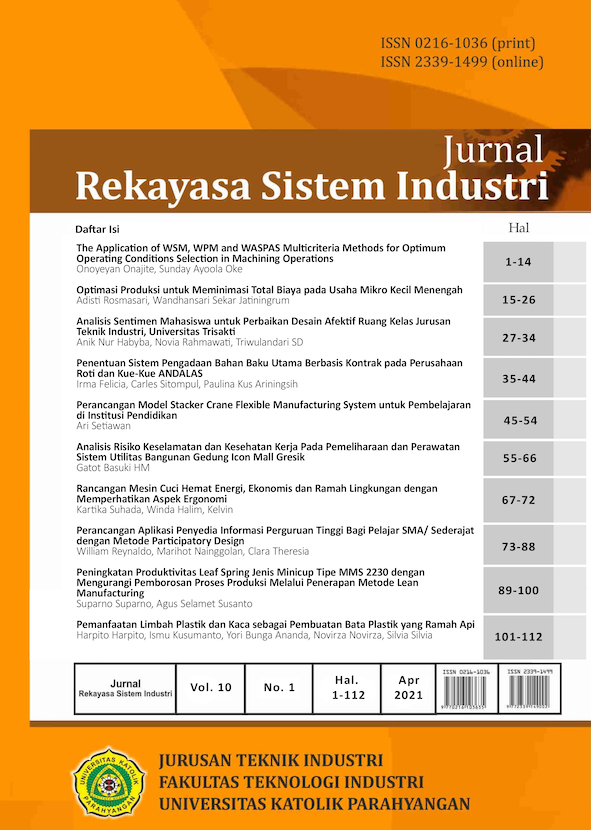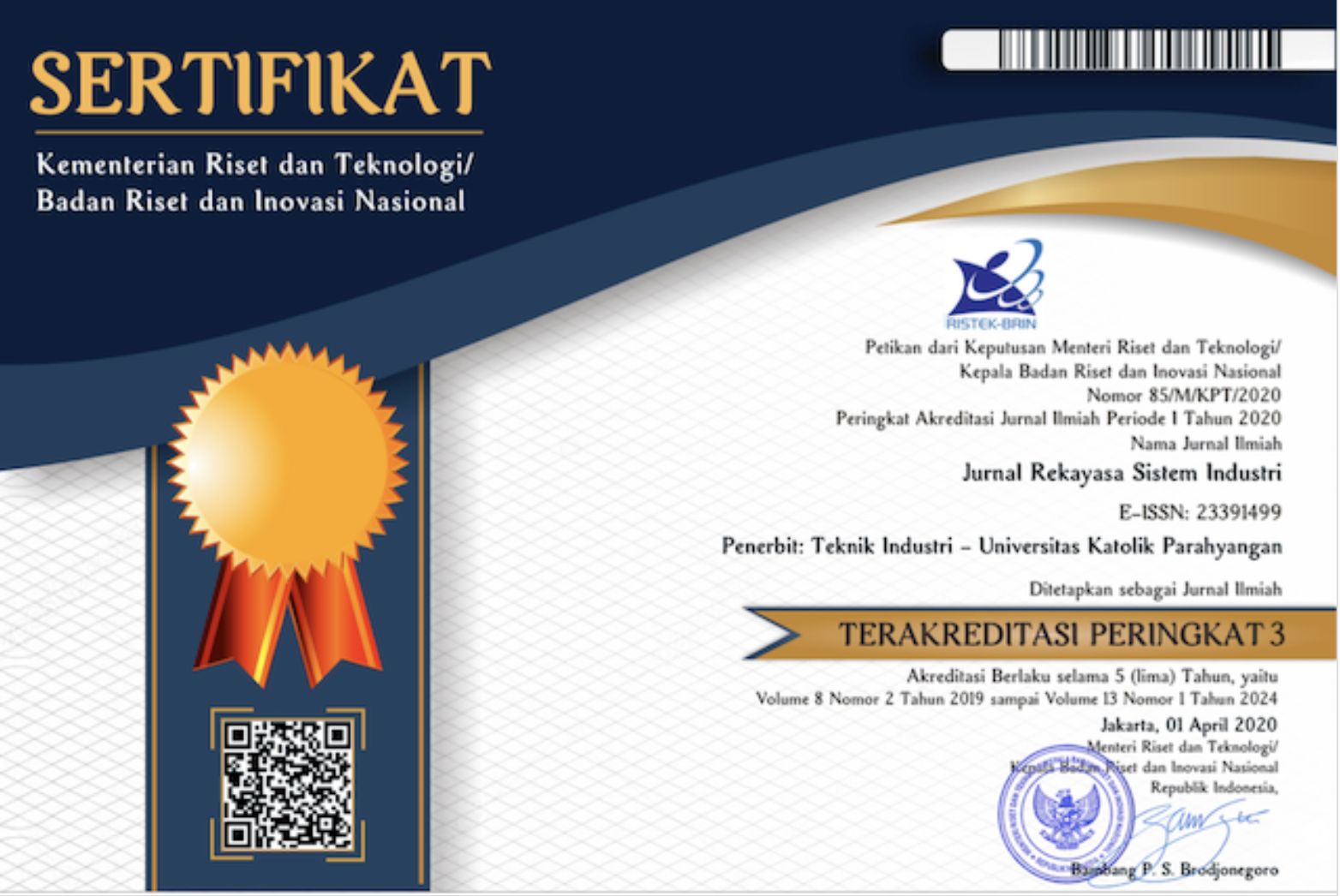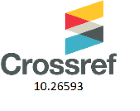The Application of WSM, WPM and WASPAS Multicriteria Methods for Optimum Operating Conditions Selection in Machining Operations
DOI:
https://doi.org/10.26593/jrsi.v10i1.4271.1-14Abstrak
Optimal condition selection in machining operations is an imperative decision for the process engineer as it influences improved tool life and surface roughness values. As the aluminium market is extremely competitive, process engineers strive to understand what to do to gain preference from prospective customers. From this viewpoint, the criteria responsible for operating decisions should be examined. In this paper the WSM, WPM and WASPAS multicriteria methods are proposed for optimal machining conditions for turned aluminium bars. A stepwise methodology of the WSM, WPM and WASPAS methods is detailed. The proposed technique was tested on published data regarding the turning of an aluminium bar, machined on a lathe machine. The case study consists of three input parameters (spindle speed, feed rate and depth of cut) and four responses (cutting temperature, cutting force, surface roughness and material removal rate). After analysing the experimental data using the models, the entropy method chose material removal rate was chosen as the best. Using the three other models, the best selection was run 17 which correspond to an input parameter of 605 rpm spindle speed, 0.12 mm/rev feed rate and 1.8 mm depth of cut. This article offers a completely new approach to operating condition selection in the turning of the aluminium bar. In the current aluminium market, it is extremely important to understand the operating conditions of the machine for enlarged customer patronage and sustainability. The unique feature of this approach is the elevated level of reliability it exhibits.
Referensi
Ameur T. 2020. Multi-objective particle swarm algorithm for the posterior selection of machining parameters in multi-pass turning, Journal of King Saud University - Engineering Sciences, In press
Bagočius V., Zavadskas K.E., Turskis Z. 2013. Multi-criteria selection of a deep-water port in Klaipeda, Procedia Engineering, Vol. 57, pp. 144–148.
Bid S. and Siddique G., 2019, Human risk assessment of Panchet Dam in India using TOPSIS and WASPAS Multi-Criteria Decision-Making (MCDM) methods, Heliyon, Vol. 5, No. 6, e01956. doi: 10.1016/j.heliyon.2019.e01956
Chakraborty S., Zavadskas E.K. 2014. Applications of WASPAS method in manufacturing decision making. Informatica, Vol. 25, No. 1, pp. 1–20.
Das D., Ali R.F., Nayak B.B., Routara B.C. 2018. Investigation on surface roughness and chip reduction coefficient during turning aluminium matrix composite, Materials Today: Proceedings, Vol. 5, No. 11, pp. 23541-23548
Das D., Chapagain A., 2018. Cutting temperature and tool flank wear during turning aluminium matrix composite in air-water spray environment - a Taguchi approach, Materials Today: Proceedings, Vol. 5, No. 9, pp. 18527-18534
Fishburn P.C., 1967, Additive utilities with incomplete product set: Applications to priorities and assignments, Operations Research Society of America (ORSA), Baltimore, MD, USA.
Hashemkhani S., Zolfani M.H., Aghdaie A., Derakhti E.K., Zavadskas M.H., Varzandeh M. 2013. Decision making on business issues with foresight perspective; an application of new hybrid MCDM model in shopping mall locating. Expert Systems with Application, Vol. 40, pp. 7111–7121.
Jayaraman P., Maheshkumar L., 2014. Multi-response optimization of machining parameters of turning AA6063 T6 aluminium alloy using grey relational analysis in Taguchi method, Procedia Engineering, Vol. 97, pp. 197-204
Jeyaprakash N., Yang C.-H., Rajkumar D. 2020. Minimum cutting thickness and surface roughness achieving during micromachining of aluminium 19000 using CNC machine, Materials Today: Proceedings, Vol. 21, pp. 755-761
Kaladhar, M. 2020, Optimization of machining parameters when machining beyond recommended cutting speed, World Journal of Engineering, Vol. ahead-of-print No. ahead-of-print. https://doi.org/10.1108/WJE-01-2020-0018
Liu H., Zheng J., Guo Y., Zhu L. 2020. Residual stresses in high-speed two-dimensional ultrasonic rolling 7050 aluminum alloy with thermal-mechanical coupling, International Journal of Mechanical Sciences, In press, Article 105824
Mali R.A., Agrahari M.D., Gupta T.V.K. 2019. FE based simulation and experimental validation of forces in dry turning of aluminium 7075, Materials Today: Proceedings, In press.
Mikolajczyk T., Fuwen H., Moldovan L., Bustillo A., Matuszewski M., Nowicki K. 2018. Selection of machining parameters with Android application made using MIT App, Procedia Manufacturing, Vol. 22, 2018, pp. 172-179. https://doi.org/10.1016/j.promfg.2018.03.027
Mohsen S., Shabnam S., Narges Z. 2015, Risk assessment of human activities on protected areas: a case study, Human and Ecological Risk Assessment: An International Journal, Vol. 21, No. 6, pp. 1462–1478.
Nayak B. 2011. Multi-response optimization in machining: Exploration of TOPSIS and Deng’s similarity based approach, M. Tech. Thesis, Department of Mechanical Engineering, National Institute of Technology, Rourkela, India
Palaniappan S. P., Muthukumar K., Sabariraj R. V., Dineshkumar S., Sathish T. 2020. CNC turning process parameters optimization on Aluminium 6082 alloy by using Taguchi and ANOVA, Materials Today: Proceedings, Vol. 21, pp. 1013-1021
Pathapalli, V.R., Basam, V.R., Gudimetta, S.K. and Koppula, M.R. 2019, Optimization of machining parameters using WASPAS and MOORA", World Journal of Engineering, Vol. 17 No. 2, pp. 237-246. https://doi.org/10.1108/WJE-07-2019-0202
Prakash K.S., Gopal P. M., Karthik S. 2020. Multi-objective optimization using Taguchi based grey relational analysis in turning of rock dust reinforced Aluminum MMC, Measurement, Vol. 157, Article 107664
Rao K.S.S., Allamraju K.V., 2017. Effect on micro-hardness and residual stress in CNC turning of aluminium 7075 alloy, Materials Today: Proceedings, Vol. 4, No. 2, pp. 975-981
Saravanakumar A., Karthikeyan S. C., Dhamotharan B., Gokulkumar V. 2018. Optimization of CNC turning parameters on aluminum alloy 6063 using Taguchi robust design, Materials Today: Proceedings, Vol. 5, No. 2, pp. 8290-8298
Siddeshkumar N.G., Shivashankar G.S., Ganesh M.N., Vibudha L.K. 2017, Experimental investigations to study the cutting force and surface roughness during turning of aluminium metal matrix hybrid composites, Materials Today: Proceedings, Vol. 4, No. 9, pp. 9371-9374
Singh, H., Kumar, V. and Kapoor, J. 2020, Optimization of WEDM process parameters in machining Nimonic 75 alloy using brass wire, Multidiscipline Modeling in Materials and Structures, Vol. ahead-of-print No. ahead-of-print. https://doi.org/10.1108/MMMS-10-2019-0178
Singh, T., Dureja, J.S., Dogra, M. and Bhatti, M.S. 2019, Multi-response optimization in environment friendly turning of AISI 304 austenitic stainless steel, Multidiscipline Modeling in Materials and Structures, Vol. 15 No. 3, pp. 538-558. https://doi.org/10.1108/MMMS-07-2018-0139
Sun R.R., Wang X.L., Zhou Z.Y., Ao X.F., Sun X.P., Song M.R. 2014. Study of the comprehensive risk analysis of dam-break flooding based on the numerical simulation of flood routing. Part I: model development, Natural Hazards, Vol. 73, pp. 1547–1568.
Tosun H.I., Seyrek E. 2010. Total risk analyses for large dams in Kizilirmak basin, Turkey. Natural Hazards and Earth System Sciences, Vol. 10, pp. 979–987.
Zavadskas E.K., Turskis Z., Antucheviciene J., Zakarevicius A. 2012. Optimization of weighted aggregated sum product assessment. Electronics and Electrical Engineering, Vol. 6, No. 122, pp. 3–6.
Zavadskas E.K., Antucheviciene J., Šaparauskas J., Turskis Z. 2013a. Multi-criteria assessment of facades’ alternatives: peculiarities of ranking methodology, Procedia Engineering, Vol. 57, pp. 107–112.
Zavadskas E.K., Antucheviciene J., Saparauskas J., Turskis Z. 2013b. MCDM methods WASPAS and multimoora: verification of robustness of methods when assessing alternative solutions. Economic Computation and Economic Cybernetics Studies and Research, Vol. 47, No. 2, pp. 5–20.
Zheng L., Yang X.M., Zhang Z.H., Liu T.I. 2008. A web-based machining parameter selection system for life cycle cost reduction and product quality enhancement, Computers in Industry, Vol. 59, No. 2–3, pp. 254-261. https://doi.org/10.1016/j.compind.2007.06.009
Zubair A.F., Mansor M.S.A., 2019, Embedding firefly algorithm in optimization of CAPP turning machining parameters for cutting tool selections, Computers & Industrial Engineering, Vol. 135, pp. 317-325. https://doi.org/10.1016/j.cie.2019.06.006













